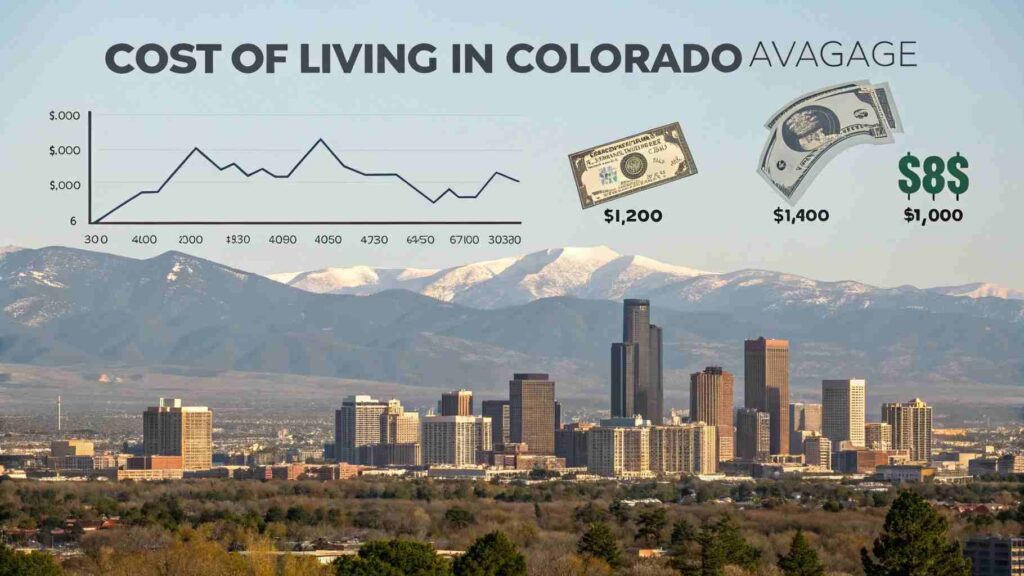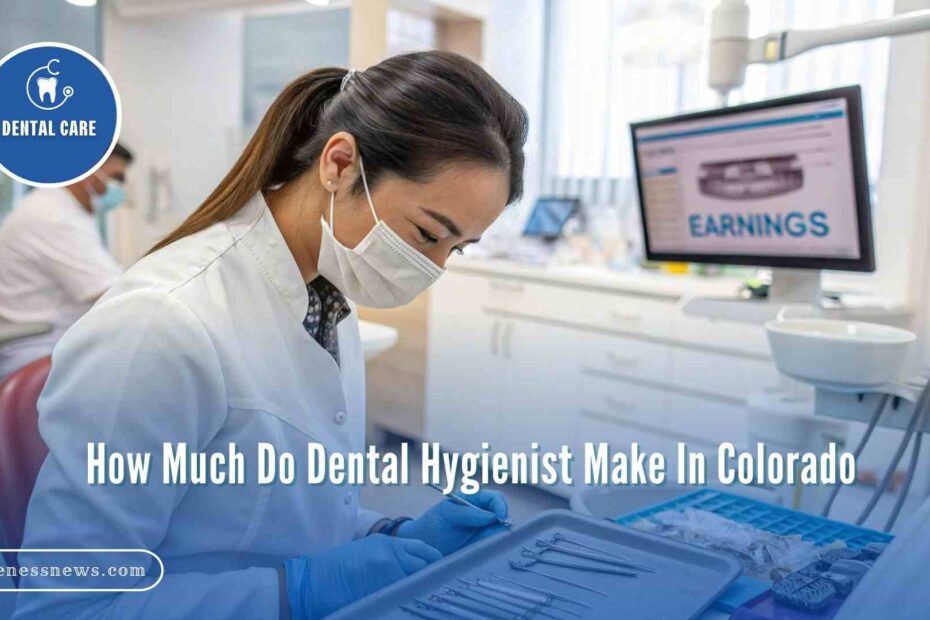Dental hygienists in Colorado make an average of $91,000 per year or $43.75 per hour in 2025. Salaries vary by experience, location, and certifications.
Stay tuned with us as we dive into the real numbers behind dental hygiene salaries! Up next: How Much Do Dental Hygienists Make In Colorado—don’t miss it!
The Average Salary of a Dental Hygienist in Colorado:
As of 2025, the average annual salary for a dental hygienist in Colorado is approximately $91,000, which is above the national average of $84,000. This translates to:
- Hourly Wage: $43.75
- Weekly Pay: $1,750
- Monthly Pay: $7,583
Salary Tiers by Experience:
- Entry-Level (0–2 years): $70,000 – $76,000
- Mid-Career (3–7 years): $83,000 – $89,000
- Senior-Level (8+ years): $95,000 – $105,000
The salary range can differ based on your geographic location within the state, experience level, certifications, and even the type of employer you work for.
Regional Salary Breakdown: Where You Work Matters:
Colorado is known for its economic diversity and geographical variety—and that applies to dental hygienist wages too. Here’s a look at how much you can earn based on location:
| City/Area | Average Annual Salary | Hourly Wage |
| Denver | $94,200 | $45.29 |
| Boulder | $95,000 | $45.67 |
| Colorado Springs | $89,500 | $43.03 |
| Fort Collins | $87,000 | $41.83 |
| Grand Junction | $82,000 | $39.42 |
| Greeley | $85,000 | $40.87 |
| Pueblo | $84,500 | $40.63 |
| Durango | $80,500 | $38.70 |
💡 Tip: Metropolitan areas like Denver and Boulder typically offer higher pay, while rural areas may offer lower base salaries but greater job stability or sign-on incentives.
Cost of Living in Colorado — Is the Salary Enough?

While Colorado dental hygienists earn more than the national average, it’s important to factor in the cost of living.
- Housing: Median home prices in Colorado are around $530,000 (2025). Rent for a one-bedroom apartment averages $1,500/month in cities like Denver.
- Utilities & Transportation: Utilities average around $150–$200/month. Gas prices and vehicle insurance can be slightly higher in urban areas.
- Groceries & Healthcare: Slightly above national average.
Bottom Line: Despite higher living expenses in some cities, dental hygienists in Colorado still enjoy strong purchasing power and financial stability.
If you’re planning to save for bigger procedures like dental implants or even relocating for school (e.g., Concorde’s dental hygiene program), Colorado’s wages provide a strong foundation.
Factors That Influence Your Salary as a Dental Hygienist:
Not all dental hygiene jobs are created equal. Here’s what can significantly affect your earning potential:
Experience:
More years = more pay. Many offices also provide longevity bonuses and merit-based raises.
Education Level:
An associate degree is the minimum requirement, but pursuing a bachelor’s or master’s degree in dental hygiene or public health can increase your value—and income.
Special Certifications:
Additional credentials like:
- Local Anesthesia Certification
- Laser Therapy Certification
- Expanded Duties Dental Hygiene (EDDH)
These can help you command higher pay and more job options.
Type of Employer:
| Employer Type | Typical Pay Range |
| Private Dental Practice | $78,000 – $94,000 |
| Corporate Dental Clinics | $85,000 – $98,000 |
| Public Health Departments | $72,000 – $88,000 |
| Educational Institutions | $60,000 – $75,000 |
| Specialty Clinics | $90,000 – $105,000 |
Full-Time vs Part-Time:
While many hygienists prefer part-time schedules (3–4 days a week), full-time positions offer higher annual earnings and access to better benefits like health insurance and retirement plans.
Career Growth and Job Outlook in Colorado:
Colorado’s dental hygiene job market is thriving. According to the Colorado Department of Labor and Employment:
- Job Growth (2024–2034): Projected at +7%, higher than the national average.
- Reason for Growth: Increased demand for preventive dental care, aging population, and dentist shortages in rural areas.
This makes now a great time to enter the field or consider a move to Colorado if you’re already certified elsewhere.
Beyond the Chair: Career Advancement Options
Not everyone wants to work chairside forever. Luckily, dental hygiene opens the door to multiple career paths, such as:
Dental Hygiene Educator: Teach at community colleges or universities. Requires a bachelor’s or master’s degree.
Public Health Hygienist: Work in community clinics, correctional facilities, or mobile dental units.
Dental Product Representative: Partner with companies to educate dentists and hygienists on products and tools.
Clinical Researcher: Collaborate with universities or dental schools on research studies.
Tele-dentistry & Mobile Hygiene: Emerging field that combines flexibility with innovation—ideal for rural outreach or entrepreneurial hygienists.
Curious about niche roles? Explore how to become a dental ceramist or even take up specialized admin paths.
Benefits That Come with the Job:
Dental hygienists in Colorado not only earn solid wages but also enjoy strong job perks, especially in full-time roles:
- Health insurance
- 401(k) retirement plans
- Paid time off and sick leave
- Continuing education stipends
- Uniform and equipment allowances
In addition, the flexibility of this role allows many hygienists to balance work with family life, hobbies, or even side businesses. Some hygienists also benefit from plans like the Comfort Dental Gold Plan.
Real-Life Testimonials: What Colorado Hygienists Say
Here’s what a few practicing dental hygienists in Colorado had to say:
I started in Fort Collins earning $72K. Within 5 years and a move to Boulder, I’m now making $95K with full benefits.” – Tanya R., RDH
Part-time work is perfect for me as a mom. I earn $42/hour, work three days a week, and still have time for my kids.” – Jessica M., RDH
Denver is competitive, but with experience and certifications, you can negotiate top-tier rates.” – Brian S., RDH
And if you’re wondering what to do when issues arise—like canceling Ameritas, Delta, or Solstice Dental Insurance—we’ve got you covered.
How to Become a Dental Hygienist in Colorado?
Interested in joining the field? Here are the steps:
- Earn an accredited degree in dental hygiene (associate or bachelor’s).
- Pass the National Board Dental Hygiene Exam (NBDHE).
- Complete a clinical exam approved by the Colorado Dental Board (e.g., WREB).
- Apply for a Colorado dental hygiene license via the Department of Regulatory Agencies (DORA).
- Optional: Pursue local anesthesia or expanded duties certifications.
FAQ’s
1. Do dental hygienists in Colorado need to complete continuing education to maintain their license?
Yes. In Colorado, licensed dental hygienists are required to complete 30 hours of continuing education (CE) every two-year license renewal period. These must include topics relevant to dental hygiene practice and at least one hour in ethics or jurisprudence.
2. Can dental hygienists in Colorado practice independently without a dentist on-site?
In some cases, yes. Colorado allows dental hygienists to practice under “limited supervision” or even independently in public health settings like schools, nursing homes, or rural clinics. However, specific certifications and written agreements with dentists may be required depending on the scope of services provided.
3. Is there a demand for bilingual dental hygienists in Colorado?
Absolutely. With Colorado’s growing Hispanic and multicultural population, bilingual hygienists (especially Spanish-speaking) are in high demand—particularly in community health clinics and urban practices. Being bilingual can also give applicants a competitive edge and improve patient care.
4. How much student debt can a dental hygiene program in Colorado incur?
Tuition costs vary, but students attending a community college program (like at Community College of Denver) might expect to pay around $12,000–$20,000 total, while private or out-of-state schools could cost $30,000–$45,000 or more. Many hygienists start at community colleges to reduce debt.
5. Are there job shadowing or internship opportunities for aspiring dental hygienists in Colorado?
Yes, and they’re highly recommended. Most dental hygiene programs in Colorado require clinical internships as part of the curriculum. Additionally, job shadowing at local dental offices or clinics is a great way for prospective students to understand the field before committing to a program.
Conclusion:
Being a dental hygienist in Colorado offers great pay, strong job growth, and plenty of career paths. Whether you’re just starting or have years of experience, this is a rewarding field with flexibility and stability. With the right training and passion, you can build a successful future here.
Also Read:
